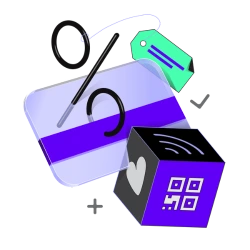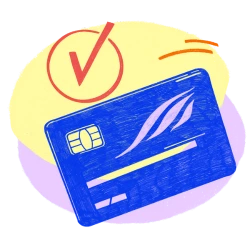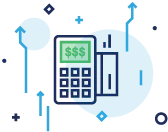What Is a Merchant Category Code (MCC)?
A merchant category code, or MCC, is a four-digit number that credit card companies use to identify the services or goods a business provides. Originally created to simplify 1099 tax form reporting, the International Organization for Standardization, or ISO, defines and sets merchant category codes. Though only four digits, these codes are important for consumers and business owners alike.
Credit card companies assign your business a merchant category code as soon as you begin accepting credit card payments. For example, Citibank may assign a clothes business the code 5599, for Retail Outlet Services [1] Citibank. Merchant Category Codes. Accessed January 6, 2022.
The merchant category code usually corresponds with the majority of a business’s sales. If a business has distinct components, it might have multiple MCCs. For example, a local grocery store with a pharmacy may have two MCCs: one MCC for its grocery sales and one MCC for its pharmacy sales.
Banks use these codes to determine rate options, interchange fees, cashback rewards, and more. Meanwhile, credit card companies use MCCs to track the industries that most utilize their cards for transactions.
Today, credit card networks have the final say in determining a business’s merchant category code. Each card network, from Visa to American Express to Mastercard, has its own MCC list, though they are mostly standardized.
Why Are Merchant Category Codes Important?
Merchant category codes are important to both businesses and consumers. Merchants’ transaction rates and fees are often determined by MCCs. For businesses, MCCs may impact the following:
- Interchange rates, or the fees a business must pay with every debit or credit card transaction
- A business’s risk assessment, as defined by card companies
- Credit card processing fees
- Specialized features available to a business, such as the option to charge convenience fees
- Tax payments, as well as the Internal Revenue Service’s classification of a business
For consumers, MCCs affect the rewards earned on categories of credit card purchases.

For business owners
One way merchant category codes affect a business is through the interchange rates offered. Companies like Visa and Mastercard use MCCs to determine the fees a business pays when it processes credit cards. Businesses should always seek to optimize interchange rates.
Credit card companies set interchange rates based on how “risky” they consider a business. Higher-risk businesses may have to pay higher fees and rates. In classifying a business, if any part of the merchant’s business falls under a merchant category code the credit card company considers high-risk, it will assign the business a high-risk code.

High-risk merchant category code classifications can also come with other downsides. This can include exclusion from the same eCommerce fraud protections as other businesses. Some MCCs, like those assigned for gambling and money orders, do not receive these protections in transactions where a card is not present. And in the case of chargebacks, the fees may be higher.
Sometimes high-risk businesses are not accepted by a credit card provider at all. For example, if a customer wants to pay for a good or service with their Health Savings Account, or HSA, your business must have the appropriate merchant category code. Also, not all businesses can charge customers a convenience fee for credit card payments. Merchant category codes can determine if a business is eligible to do so.
In contrast, some types of businesses or organizations can get a lower interchange rate due to their merchant category code. These businesses can include nonprofits or businesses from emerging markets, like healthcare or education.
An MCC may also affect a business’s tax reporting. For example, an MCC can affect a business if it is eligible to report some payments on a Form 1099-MISC.

For consumers
The main way that merchant category codes affect the consumer is through credit card reward calculations.
Today, cashback and credit card rewards can be significant factors for consumers. Credit card companies lump together purchases into spending categories. Certain spending categories often earn the cardholder rewards or extra rewards. The select spending category earning rewards usually rotates on a monthly or quarterly basis.
Some consumers may be surprised to learn that eligibility for these rewards is not determined by the items purchased. Instead, the merchant category code decides reward eligibility. So, if a person buys a hot sandwich from their local grocery store, it may go toward the grocery store category, rather than the restaurant category. This information is key for cardholders attempting to maximize their rewards.
Merchant category codes can also help consumers understand bank statements and identify charges. For example, if someone sees their monthly statement and doesn’t recognize a charge, the MCC can help them place the vendor.
Finally, for customers holding business cards, an MCC determines what they can report on their Form 1099-MISC.
Examples of Merchant Category Codes
Let’s take a real-world example where MCCs come into play.
Say you run a business where employees can use their company card for work expenses. One of your employees submits an expense report for $300 of party supplies for the office from a business called Local Pharmacy. They don’t attach a receipt to the report and the MCC catches your eye.
You see that the MCC for Local Pharmacy is not 5912, the common code for pharmacies and drugstores. Instead, it’s 5813—the MCC for a bar! Local Pharmacy is actually a cleverly-named bar. Thanks to your knowledge of MCCs, you aren’t fooled.
Merchant Category Code Lookup
So how do you find your MCC? Or the MCCs of other businesses?
Businesses can contact their credit card processors to ask for their MCC. If you believe your business has the wrong MCC or you need to update it, you can reach out to your merchant service provider or payment processor.
There are a few other tools below to help you locate an MCC.
Where can you find a merchant category code?

Credit card companies each have their own MCC lists. This means that you can go through a card network to find its MCC lists. To do so, search the name of the processor and “merchant category codes” to pull its list up.
Many merchant account providers post MCC listings to make this simpler. You can also call the number on the back of your credit card for guidance from the company.
Visa has a useful Merchant Locator Tool to look up MCCs [2] Visa. Merchant Locator Tool. Accessed January 6, 2022 . This allows a person to look up MCCs wherever they shop. Simply search for a business in your geographic area or search by the exact company name. This tool also lets users look up merchants by MCC.
List of Merchant Category Codes
Now that you understand what MCCs are, how they affect businesses and cardholders, and where to find them, let’s look at lists of real MCCs.
Here is an example of some of the most popular MCCs:
| Merchant Category Code (MCC) | Description | Business Examples |
|
5411 |
Grocery stores |
Whole Foods, Fairway Market |
|
5812 |
Restaurants |
TGI Friday’s |
|
5814 |
Fast-food restaurants |
McDonald’s, Burger King |
|
5912 |
Pharmacies |
CVS, Walgreens |
|
5942 |
Bookstores |
Barnes and Noble |
Here is an example of some high-risk MCCs:
| Merchant Category Code (MCC) | Description |
|
5993 |
Cigar stores |
|
5996 |
Direct Marketing—Outbound Telemarketing Merchants |
|
5967 |
Direct Marketing—Inbound Teleservices Merchants |
|
7995 |
Betting, e.g. Wagers at Race Tracks, Lottery Tickets, Casino Gaming Chips |
Some businesses have their own unique MCC. For example, Hyatt Hotels’ MCC is 3640. A large company with at least $10 million in revenue can apply for a unique code through a technical committee formed by the ISO.
Final Thoughts
MCCs are four digits that affect many aspects of your business, from your credit card processing options, fees you’ll pay, to the way you fill out your taxes. In the worst case, the wrong MCC classification can cause customers to avoid your business. However, you can avoid that by finding the right credit card processing solution with a team working to ensure your merchant category code works for your business.






